Project for a New American Century
description: former American neoconservative think tank
17 results
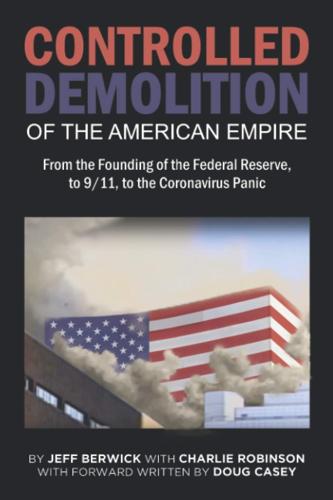
The Controlled Demolition of the American Empire
by
Jeff Berwick
and
Charlie Robinson
Published 14 Apr 2020
The criminals that share responsibility for 9/11 are not Arab hijackers armed with box cutters and pocket-sized Quorans, but rather a faction of the American Military-Information-Terror complex, the members of the Project for a New American Century (PNAC), a handful of cooperating foreign governments, and a slew of double agents operating within the White House. The members of the Project for a New American Century should be tried for their crimes, including treason, and if found guilty, executed. That is what happens when spies get caught. The “Permanent State” As Ron Paul once said, “In an empire of lies, the truth is treason”.
…
The reason why 9/11 had to happen, as seen through the eyes of the Globalist cabal running the world, was to use the event as the pretext to unveil a control grid and reduction of personal rights that Orwell would be shocked by, while also creating the cover story to justify launching the “War on Terror” in order to destroy the powerful countries that challenged the Project for a New American Century’s vision for the Middle East.5 The story of Muslim hijackers was a lie designed to give America a reason to get involved in a military conflict that would destroy the Middle East, make the arms companies richer than they already were, control the oil in Iraq and prevent Saddam Hussein from selling it for anything other than the dollar, allow the CIA to control the $15 trillion in minerals and set up their opium growing and distribution operation in Afghanistan to fund their black projects, make sure none of the regional countries were allowed to challenge Israel’s control of the region, allow trillions of dollars to be diverted into the intelligence agencies, replace foreign leaders with ones of PNAC’s choosing, remove a couple of million Muslims from the planet, create a culture of fear within America, and drain the wealth from the United States in order to weaken the country so that it can be brought down later.
…
They were not prosecuted.12 • The Dancing Israeli’s went on national television in Israel and admitted that they “were there to document the event”.13 • On June 22, 2001, Urban Moving Systems received a one-time payment of $498,750 from the Federal Government Assistance Program.14 • Odigo, an Israeli instant messaging service, said that two of its workers received messages two hours before the Twin Towers attack on September 11 predicting the attack would happen.15 • The American Think Tank “The Project For a New American Century” (PNAC) published a paper just 12 months before the event claiming that in order for their proposal to get the type of support they believed they would require, they would need “some catastrophic and catalyzing event – like a new Pearl Harbor”. • Half of the members of PNAC are dual U.S.
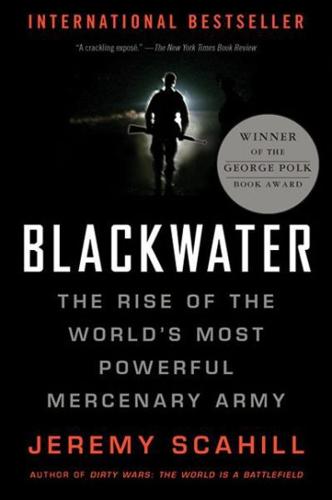
Blackwater: The Rise of the World's Most Powerful Mercenary Army
by
Jeremy Scahill
Published 1 Jan 2007
But privatization was only part of the broader agenda. Cheney and Rumsfeld were key members of the Project for a New American Century, initiated in 1997 by neoconservative activist William Kristol.4 The group pressed Clinton to enact regime change in Iraq, and its principles, which advocated “a policy of military strength and moral clarity,”5 would form the basis for much of the Bush administration’s international agenda. In September 2000, just months before its members would form the core of the Bush White House, the Project for a New American Century released a report called Rebuilding America’s Defenses: Strategy, Forces and Resources for a New Century.
…
Erik Prince and his family have provided generous funding to the religious right’s war against secularism and for expanding the presence of Christianity in the public sphere.27 Prince is a close friend and benefactor to some of the country’s most militant Christian extremists, such as former Watergate conspirator Chuck Colson, who went on to become an adviser to President Bush and a pioneer of “faith-based prisons,” and Christian conservative leader Gary Bauer, an original signer of the Project for a New American Century’s “Statement of Principles,” whom Prince has worked alongside since his youth and who was a close friend of Prince’s father. Some Blackwater executives even boast of their membership in the Sovereign Military Order of Malta,28 a Christian militia formed in the eleventh century, before the first Crusades, with the mission of defending “territories that the Crusaders had conquered from the Moslems.”29 The Order today boasts of being “a sovereign subject of international law, with its own constitution, passports, stamps, and public institutions” and “diplomatic relations with 94 countries.”30 The outsourcing of U.S. military operations in Muslim countries and in secular societies to such neo-crusaders reinforces the greatest fears of many in the Arab world and other opponents of the administration’s wars.
…
“It appears to me that this has created a lack of respect and trust, and has resulted in an ineffective Office of the Inspector General.”72 In March 2003, a year after Schmitz took over as the Pentagon IG, and just as the Iraq invasion was beginning, he found himself responsible for investigating a scandal that rocked one of the key architects of the administration’s Iraq policy: Richard Perle, a leading neoconservative activist, founder of the Project for a New American Century and chair of the Defense Policy Board. Perle was close to Deputy Defense Secretary Paul Wolfowitz and had an office right next to Rumsfeld’s at the Pentagon.73 As the Iraq invasion was getting under way, the New York Times and The New Yorker magazine revealed that Perle was using his position to lobby for corporate clients in their dealings with the Defense Department.74 “Even as he advises the Pentagon on war matters, Richard N.
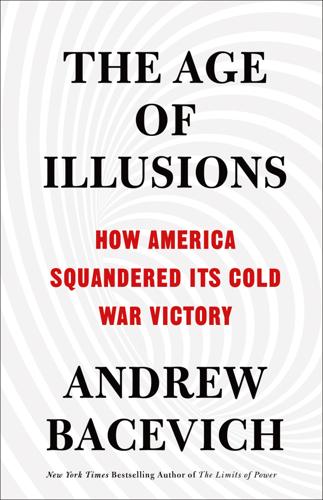
The Age of Illusions: How America Squandered Its Cold War Victory
by
Andrew J. Bacevich
Published 7 Jan 2020
So if his pitch had a familiar Reaganesque ring, it was also more than slightly off-key. Rubio vowed to lay the foundation for what he called a “New American Century.” Yet in embracing this phrase, laden with connotations that were the very inverse of Donald Trump’s revived use of “America First,” he was tacitly aligning himself with the neoconservative “Project for a New American Century” that for years before 2003 had vociferously lobbied for the United States to depose Saddam Hussein. As had Jeb Bush, Rubio tied himself in knots trying to answer the Iraq question, unable to justify yet unwilling to disavow his support for a preventive war that had gone badly awry.22 More broadly, he seemed unaware of what the post–Cold War fervor for militarized hegemony had actually yielded in terms of gains and losses.
…
Ross Perry, Rick Persian Gulf War (1990–91) Philippines Poland Politico Polk, James poor populism post–Cold War (Emerald City) consensus Bill Clinton and Buchanan and Bush Jr. and Bush Sr. and climate change and dawn of as elite-managed democracy failure of failure of, and American condition in 2016 failure of, and elections of 1992 freedom and Fukuyama’s “end of history” and globalization and Hillary Clinton and militarism and military service and normalization of war and Obama and Perot and presidential power and primaries of 2016 and reframing conversation on Trump of 2000 and Trump’s election as rejection of Powell, Colin power elite Presbyterians preschool, universal presidential supremacy unitary executive and preventive war Princeton University privacy Progressive movement progressives Project for a New American Century Protestant, Catholic, Jew (Herberg) Puritanism Putin, Vladimir race and racism Bill Clinton and Bush Jr. and Obama and Trump and Rather, Dan Reagan, Ronald Farewell Address Gorbachev and “Star Wars” and Rector, Ricky Ray Reed, Donna Reform Party religion Republican Party Bush Jr. and McCain and primaries of 2016 Trump and retirement savings Revolution in Military Affairs (RMA) Rice, Condoleezza Rio Pact (1947) Roe v.
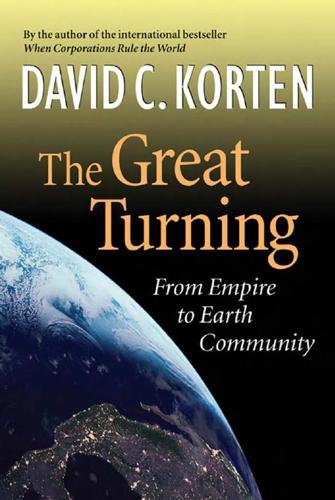
The Great Turning: From Empire to Earth Community
by
David C. Korten
Published 1 Jan 2001
Leading Republican neoconservatives Bill Kristol and Robert Kagan followed up with an article in Foreign Affairs that called for the United States to establish a “benevolent global hegemony.” In 1997, Kristol and Kagan joined a virtual who’s who of top-level defense officials and advisers from the Reagan and Bush I administrations to form the Project for a New American Century (PNAC). Wake-Up Call 231 Founding members included Cheney, Wolfowitz, Donald Rumsfeld, and Richard Perle, who formed the Bush II defense-policy team; and Jeb Bush, Bush II’s brother. In September 2000, PNAC issued a report titled Rebuilding America’s Defenses: Strategy, Forces and Resources for a New Century.
…
See also family issues Parks, Rosa, 202–203 Parks, Sharon, 43 partnership biological, 268, 274, 280, 291 contemporary context for, 295–297 culture, 53, 258 model, 19, 29–40, 222 narrative, 41 politics of, 81 power, 36–37, 100 societies, 291–294 pathology of Empire, 35–36, 37 patient capital, 344 Pax Americana, 230–235 Pax Romana, 119–121 Peace Alliance, 321 peak oil, 61, 244 Pearl Harbor attack, 213 INDEX Penn, William, 171 Pennsylvania, restrictions of corporate ownership of shares, 192 People-Centered Development Forum, 11 People’s Earth Declaration, 85–86 People’s Party, 207 perfect storm, economic, 70–72 Perkins, John, 198 Perlas, Nicanor, 18, 19 Perle, Richard, 231 Permanent Court of Arbitration, 81 permeable boundaries, principle of, 293–294 petroleum reserves, 60–62 PFN (Positive Futures Network), 14, 17–18 pharaohs, deification of, 114 Philippine National Irrigation Administration (NIA), 10 Philippines, 193 philosophy of scientific revolution, 256 physical infrastructures, 298 physical world, 254–255 Piaget, Jean, 43 Pinchot, Gifford, 16 Pinchot, Libba, 16 Pinochet, Augusto, 196 piracy, 128–129 place, principle of, 292 planetary stress, 58–60 Plato, 146, 147, 148, 151, 154 pluralism, 171–173 plutocracy, 161, 164–165, 180, 219 agenda of, 223 Alexander Hamilton and, 184–185 American, 182 as bipartisan cause, 227–228 constitutional, 185–187, 341–342 corporate, 219 United States as, 185 plutocrats versus populists, 209 PNAC (Project for a New American Century), 230–231, 233 Policy Planning Study (U.S. State Department), 195 political consensus, 331–334 political democracy, 134–135, 140–141, 143–144, 345 political domination, 18 political institutions, role of, 305–306 political manipulators, 50 393 political principles, of Earth Community, 38 political process, 346–349 political sphere, 342 political theory, Rousseau’s, 153–154 political turning, 21, 81–83, 320–322 politics of culture, 248–249 living, 345–349 stealth, 223–227 poorest people worldwide, 299 population, 59, 97 populists versus plutocrats, 209 Portugal, 127 Positive Futures Network (PFN), 14, 17–18 Post-Corporate World: Life after Capitalism (Korten), 15 potential of humanity, failure of, 36 poverty, 304 Powell, Lewis, 220 power abuses of, 241 asymmetrical relationship of, 207 centralized, 10–11 coercive, 104 of corporations, 333 dominator, 34 of economic and political domination, 18 generative, 97 localization and distribution of, 303–305 maturity of those in, 151 men’s compared to women’s, 105–106 source of Empire’s, 82 Power Seekers, 328, 329–330, 339 practical politics, 31 pre-agricultural societies, 97 pre-Empire civilizations, 166 pre-Empire humans, 94 pre-imperial societies, 109–110 presidents, U.S., 184 principles for organizing partnership societies, 291–294 priorities, 72, 244–245, 327 privateers, 128–129, 141 private property, 150 problem solving, 315 producing classes, 210 product placement, 338–339 394 profiting from public credit, 188–189 progressive issues, roots of, 302–303 progressive movements, 330 progressives, 329–330, 339 Project for a New American Century (PNAC), 230–231, 233 property, 139–140, 150, 189, 208–209 prosperity, 249, 250, 303–305 Protestant Ethic and the Spirit of Capitalism, The (Weber), 164 Protestant Reformation, 123 psychological health, 285, 335 psychology behavioral, 269–270 of Earth Community, 52–53 of Empire, 48–52 publicly traded limited-liability corporations, 131–133 public opinion, 191–192 public outrage, 186–187 Puerto Rico, 193 Puritans, 162–163, 171–172 Quakers, 163, 164, 171, 202 quality of life, 80, 305 race-based slavery, 169 racketeering, 211 Raleigh, Walter, 161 Rapture, 223, 260–261, 287 Ray, Paul, 47, 79, 80, 323–324 Reagan, Ronald, 227, 230, 240 real assets, 139–140, 150, 189, 208–209 reality, explanations of, 280 rebellions, 173–174, 175–176, 203 Rebuilding America’s Defenses: Strategy, Forces and Resources for a New Century, 231 rebuilding economies, bottom-up efforts, 13–14 Reed, Ralph, 222 reflective consciousness, 281–282, 309, 310, 358 relationships of Earth Community, 36–38 of Empire, 34 family, 349–350 human communities/natural communities, 32–33 human desire for, 310 INDE X importance of, 299 life depends on, 274, 292, 299, 309 loving, 285 models for organizing, 39–40 trust, 305–306 religious issues biblical meaning story, 246–247 Christ, 247–248, 258–259, 261, 265, 325 Christian Bible, 257 Christianity, 121–122 Christian Reconstructionism, 223 Christian Right, 223–224 Christian theology, 254 Christian values, 339 competing religious influences (colonial), 163–164 conflict between science and religion, 253–257, 264 of English colonies, 170 fundamentalists, 189 images of God, 257–263 imperial biblical meaning story, 246–247, 249 importance of religion to Americans, 325 Jesus, 225, 247–248, 258–259 mandated state religion, 162 pluralism, 171–173 prevailing Western religious story, 308 the Rapture, 287 religion in service of Empire, 352 religion of the strict father, 254 religious freedom, 205 religious versus scientific doctrine, 255 Roman Church, 259 waiting for the Rapture, 260–261 Religious Roundtable, 222 renewal, 278–279 Republic, The (Socrates), 148 Republican Party, 223 republics, 117–119, 127, 185 reservations, Indian, 205 resistance, against corporate globalization, 318–319 resistance movements, 65, 176, 193, 205, 317 resources, monopolization of, 34 responsibility for harms caused, 344 retirement benefits, 213 revolution, scientific, 256, 266 revolutions/wars INDEX abolishment of use of, 81 American Revolution, 133, 160, 178–179, 180, 206 Civil War, 191 evolution wars, 256–257 fire power, 65–66 French Revolution, 133 Green Revolution, 62 Gulf War (1991), 64 Iraq war (2003), 197, 232–235 Mexican-American War, 191 Napoleonic Wars, 133 Opium War, 130 Revolutionary War, 177–178 self-destructive, 63–64 Seven Years War, 175 Spanish-American War, 193 striking during wars, 213 on terrorism/terrorists, 231–235 U.S.
…
State Department), 195 political consensus, 331–334 political democracy, 134–135, 140–141, 143–144, 345 political domination, 18 political institutions, role of, 305–306 political manipulators, 50 393 political principles, of Earth Community, 38 political process, 346–349 political sphere, 342 political theory, Rousseau’s, 153–154 political turning, 21, 81–83, 320–322 politics of culture, 248–249 living, 345–349 stealth, 223–227 poorest people worldwide, 299 population, 59, 97 populists versus plutocrats, 209 Portugal, 127 Positive Futures Network (PFN), 14, 17–18 Post-Corporate World: Life after Capitalism (Korten), 15 potential of humanity, failure of, 36 poverty, 304 Powell, Lewis, 220 power abuses of, 241 asymmetrical relationship of, 207 centralized, 10–11 coercive, 104 of corporations, 333 dominator, 34 of economic and political domination, 18 generative, 97 localization and distribution of, 303–305 maturity of those in, 151 men’s compared to women’s, 105–106 source of Empire’s, 82 Power Seekers, 328, 329–330, 339 practical politics, 31 pre-agricultural societies, 97 pre-Empire civilizations, 166 pre-Empire humans, 94 pre-imperial societies, 109–110 presidents, U.S., 184 principles for organizing partnership societies, 291–294 priorities, 72, 244–245, 327 privateers, 128–129, 141 private property, 150 problem solving, 315 producing classes, 210 product placement, 338–339 394 profiting from public credit, 188–189 progressive issues, roots of, 302–303 progressive movements, 330 progressives, 329–330, 339 Project for a New American Century (PNAC), 230–231, 233 property, 139–140, 150, 189, 208–209 prosperity, 249, 250, 303–305 Protestant Ethic and the Spirit of Capitalism, The (Weber), 164 Protestant Reformation, 123 psychological health, 285, 335 psychology behavioral, 269–270 of Earth Community, 52–53 of Empire, 48–52 publicly traded limited-liability corporations, 131–133 public opinion, 191–192 public outrage, 186–187 Puerto Rico, 193 Puritans, 162–163, 171–172 Quakers, 163, 164, 171, 202 quality of life, 80, 305 race-based slavery, 169 racketeering, 211 Raleigh, Walter, 161 Rapture, 223, 260–261, 287 Ray, Paul, 47, 79, 80, 323–324 Reagan, Ronald, 227, 230, 240 real assets, 139–140, 150, 189, 208–209 reality, explanations of, 280 rebellions, 173–174, 175–176, 203 Rebuilding America’s Defenses: Strategy, Forces and Resources for a New Century, 231 rebuilding economies, bottom-up efforts, 13–14 Reed, Ralph, 222 reflective consciousness, 281–282, 309, 310, 358 relationships of Earth Community, 36–38 of Empire, 34 family, 349–350 human communities/natural communities, 32–33 human desire for, 310 INDE X importance of, 299 life depends on, 274, 292, 299, 309 loving, 285 models for organizing, 39–40 trust, 305–306 religious issues biblical meaning story, 246–247 Christ, 247–248, 258–259, 261, 265, 325 Christian Bible, 257 Christianity, 121–122 Christian Reconstructionism, 223 Christian Right, 223–224 Christian theology, 254 Christian values, 339 competing religious influences (colonial), 163–164 conflict between science and religion, 253–257, 264 of English colonies, 170 fundamentalists, 189 images of God, 257–263 imperial biblical meaning story, 246–247, 249 importance of religion to Americans, 325 Jesus, 225, 247–248, 258–259 mandated state religion, 162 pluralism, 171–173 prevailing Western religious story, 308 the Rapture, 287 religion in service of Empire, 352 religion of the strict father, 254 religious freedom, 205 religious versus scientific doctrine, 255 Roman Church, 259 waiting for the Rapture, 260–261 Religious Roundtable, 222 renewal, 278–279 Republic, The (Socrates), 148 Republican Party, 223 republics, 117–119, 127, 185 reservations, Indian, 205 resistance, against corporate globalization, 318–319 resistance movements, 65, 176, 193, 205, 317 resources, monopolization of, 34 responsibility for harms caused, 344 retirement benefits, 213 revolution, scientific, 256, 266 revolutions/wars INDEX abolishment of use of, 81 American Revolution, 133, 160, 178–179, 180, 206 Civil War, 191 evolution wars, 256–257 fire power, 65–66 French Revolution, 133 Green Revolution, 62 Gulf War (1991), 64 Iraq war (2003), 197, 232–235 Mexican-American War, 191 Napoleonic Wars, 133 Opium War, 130 Revolutionary War, 177–178 self-destructive, 63–64 Seven Years War, 175 Spanish-American War, 193 striking during wars, 213 on terrorism/terrorists, 231–235 U.S.
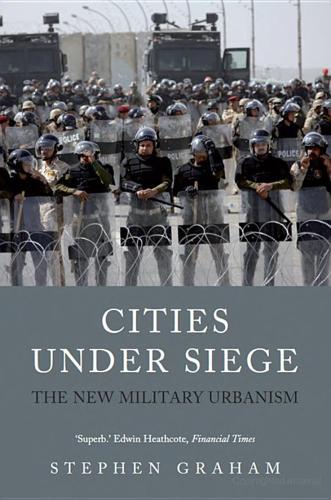
Cities Under Siege: The New Military Urbanism
by
Stephen Graham
Published 30 Oct 2009
Hence, such interventions become more common, more aggressive, and more pre-emptive. They become a basis for US strategy. Such perceptions were central to the Bush administration’s launching of ‘pre-emptive war’ as part of an ongoing, unbounded War on Terror post-9/11, and to earlier, influential pronouncements by the neoconservative Project for a New American Century that US forces must be redesigned for the post–Cold War era so that they could ‘fight and decisively win multiple, simultaneous major theatre wars’. ‘It is now possible to use America’s military might’, wrote US military theorist Raymond O’Mara in 2003, ‘with a greatly reduced chance of suffering friendly casualties or equipment loss’.
…
Since the days of Jimmy Carter, US foreign and military policy has been organized around the imperative of using, as he famously put it, ‘any means necessary, including military force’, to safeguard the supply and flow of Persian Gulf oil.136 The invasion of Iraq was the direct result of the imposition of a new, pre-emptive warfare strategy, developed by a group of neoconservatives and designed, in part, to secure US control over the rapidly diminishing strategic oil reserves in both the Middle East and the Caspian basin. As former deputy secretary of defence Paul Wolfowitz – a key co-author, along with Donald Rumsfeld and Dick Cheney, of the pivotal Project for a New American Century report in 2000, ‘Rebuilding America’s Defenses’ – once put it, Iraq ‘floats on a sea of oil’.137 Even though the exploitation of Iraqi oil since the 2003 invasion has occasioned much violence and disruption, the cartel of major Western oil companies had managed, by early 2008, to regain the massive oil concessions that they had lost in 1972 when Iraq nationalized the country’s reserves.138 The decision to remove Saddam Hussein – made, at the very latest, in January 2001, well before the 9/11 attacks139 – was a result of a new and aggressive policy of reshaping Middle East geopolitics using the unassailable military firepower of the US, with a view to attaining hegemonic control over the world’s major remaining oil reserves.
…
See urban warfare, training cities PlayStation, xxvi, 69,215, 217, 221–22, 321 Plonisch, Igor, 125 n.127 Pluralism (Connolly), 73–74 Pockett, Consuella, 256 n.111 Poindexter, John, 127 polarization, 5, 7, 17, 35, 38–39, 45, 52, 100, 102, 107, 112, 143, 150, 356, 383 police, militarized, 96, 97,98–99 political equator, 119, 120, 380 Pollard, Tom, 236, 237 n.39 Porta, Donatella della, 380 n.82 Portefaix, Valérie, 132 n.155 Postmodern War (Gray), 69 n.31 poverty, 146; concentration of, 6–7,109; and wealth, 5–6 Pravecek, Tasha, 254 n.105 Pred, Allan, 54 n.77, 348 n.2 Predator See drones Primary Purpose (Pastor Ted), 46 prison, xvii-xviii, 5, 63, 73, 109; camp, xxii, xxv, 78; population, 7, 109–10, 111; as warehouse, 95, 109–10 Privacy & Law Enforcement (Brown), 117 n.112 privatization, 4, 7–8, 54 n.75, 87, 102, 144, 259, 297, 309, 338, 357, 365, 380 Project for a New American Century, 156, 335 protest, xviii, 59, 78, 94, 109, 121, 122, 123, 148, 166, 218, 244, 246–47, 270, 343, 349, 360, 367, 372, 384 Provoost, Michelle, 14 n.58 Pruett, Richard, 127 n.133, 136 Pryke, Michael, 4 n.7 PSYOPS, 283 PTSD, 211 Puar, Jasbir, 56–57, 236 n.38 public health, xxiv, 5, 112, 265, 279, 282, 290 public space, 102, 104, 309, 350, 365, 378 Putin, xxv, 266 quality of life, 102 Qureshi, Emran, 39, 57 n.92 Rabin, Yitzak, 233 Rafael, 247, 255 Rai, Amit, 56, 236 n.38 Ramallah, 194, 226 Ramirez, Marcos, 359, 360 Rampton, Sheldon, Weapons of Mass Deception,70 n.35 RAND, 160, 185, 187, 195–98, 227–28 Randall, Doug, 339–40 Rao, Vyjayanthi, 268 n.15 Rapaille, Clotaire, 319–20 Rathke, Wade, The Battle for Lower Ninth,86 n.107 Rattray, Gregory, 291 n.105 Ray, Gene, 5, 376 Raymond, Antonin, 186 Raytheon, xi, xiii, xvi, xxii, xxvi, 139, 172, 215 Red Cross, 119 Regan, Tom, 224 n.138 Reid, Julian, 41 Reilly, William M., 1 n.3 Repent America, 46 Republican National Convention, 360 RESTORE Act (US), 141–2 Revolution in Military Affairs (RMA), 14, 28–29, 32, 78, 154–62 passim, 271; neglects urbanization, 156; undermined by urban terrain, 158, 162; urban turn of, 157, 160–61, 167–68, 174–77 Richfield, Paul, 215 n.104 Ridgley, Jennifer, 99 n.44 Rizer, Kenneth, 275 n.43, 276–77 Robb, David, 223 n.133 Robb, John, 264, 269–70; Brave New War,142–44 Roberts, Susan, 29 n.124 Robinson, Jenny, xxviii n.27 robotic insects, 173–74 Robotics Institute, 368 robotized war, 167–82 passim; inevitable errors of, 181; and war crimes, 178 Rogers, Rick, 211 n.89 Rohozinski, Rafal, 240 n.56 Rollins, John, 128 n.134 Ronfeldt, David, 22 n.89, 155 n.7 Rosas, Gilberto, 96 n.41 Rose, David, 109 n.74 Rose, Nikolas, 95 n.37 Rosen, Jeffrey, 330 Rosenberg, Barry, 292 n.111 Ross, Andrew, 15, 31, 32 n.136, 45 n.43, 47 n.52, 306 n.24 Ross, Kristin, Fast Cars, Clean Bodies xx Rostow, Walt, 273; The Stages of Economic Growth, 272 Rowat, Colin, 280, 282 Rowell, Steve, 196 Roy, Ananya, 144 Ruggiero, Vincenzo, 107 Rumsfeld, Donald, 29, 154, 273, 335 Rupert, James, 178 n.88 rural soldiers, 61 Russia, xxv, 228, 266, 292, 335 Sadr City, 130, 248 Said, Edward, 226 n.2, 232, 233 n.22; Orientalism,36, 37 n.6, 56 Salingaros, Nikos, 41 Salon.com, 372 Salopek, Paul, 306 n.21, 312 n.45 Salter, Mark, 99 n.45, 136 n.175 Sanchez, Ricardo, 57–58 sanctions, 279–83, 287–88 Sanders, Ralph, 250 n.86 Sao Paulo, 112 Sassen, Saskia, The Global City, xxix n.30 satire, 374–78 Saudi Arabia, 338 Schattle, Duane, 32 Scheer, Robert, 224 n.136 Schell, Jonathan, 162 Schimmel, Kimberly, 125 n.124 Schleiner, Anne-Marie, 360, 361 Schmidt, Rick, 319 Schmitt, Charles, 129 Schmitt, Eric, 223 n.135 Schreier, Fred, 75 n.52 Schueller, Malini Johar, 154 n.6, 234 n.29 Schwartz, Michael, 335 n.136 Schwartz, Peter, 339–40 Schwarzenegger, Arnold, 318 Scott, Ridley, 224 n.136 Scraton, Phil, 94 Seager, Ashley, 7 n.23 Seal, Cheryl, 225 Seattle, 22, 121 Seavey, Frank, 75 n.56 Second World War, 64, 153, 186, 267, 274, 372 Secor, Anna, 29 n.124 security, vs trade, 134–35 The Security Economy (OECD), 75 securocratic war, 91–94, 100, 107, 112–13, 117, 119, 132–33, 149–52, 253, 255, 298, 349, 354, 368 Segall, Stu, 200 Sells, Michael, 39, 57 n.92 Sengoopta, Chandak, Imprint of the Raj, xvii n.8 Sennett, Richard, 299 September 11, 38, 41, 45 n.43, 59, 71, 79–82, 116, 126, 156, 260, 267, 335, 344; as act of God, 46; economic consumption as response to, 67; and media, 68–69; nationalities on list of dead, 81–82 Servielle, Jean, 19 Shachtman, Noah, 215 n.103, 270 n.20, 330 n.123 Shaffer, Mark, 187 Shalit, Gilad, 287 Shamir, Ronen, 89 Shapiro, Michael, 147, 148 n.215 Sharlet, Jeff, 46 Sharon, Ariel, 231–33, 250 Shatz, Howard, 135 n.168 Shaw, Martin, 13 n.48&52 Shenzen, 117 Sheptycki, James, 22 n.91, 131–2 Sherry, Michael, 175 Shifting Fire, 240 Shihade, Magid, 22 Shohat, Ella, 25 shoot-to-kill, 258–59 Shryock, Andrew, xix n.11, 81 Signal, 24 Signs of the Times (blog), 23 Silicon Valley, 14 Simon, David, 43 Simon, Jonathan, 109 Singel, Ryan, 141 n.184&186 Singer, Peter W., 324 n.103 Singh, Anne-Marie, 94 n.28 Sirhal, Maureen, 330 n.121 Skeates, Richard, 47 Sklar, Holly, 7 n.21 Slater, David, 379, 380 n.81 Slavick, Elin O’Hara, 355, 356 Smith, Colin, 293 n.118 Smith, David, 284 n.74 Smith, Jacqui, xi Smith, Jeremy Adam, 42 n.32, 52 n.68 Smith, Michael Peter, Transnational Urbanism, xxvii n.23, 77 n.62 Smith, Neil, 87, 134 n.158&161, 136 n.170 Smith, Thomas, 283 n.69 Snyder, Donald, 253 n.99 Snyder, Mary Gail, 24 n.104 Soffer, Arnon, 227 Soja, Edward, 132 n.154 Solnit, David, 371 n.59 Soriano, César, 223 n.133 Soros, George, 295 South, urban explosion, 2–3 South Africa, 15, 49, 107, 261 Spain, 119; and Iraq war, 82 Sparke, Matthew, 29 n.124, 140 Sparrow, Robert, 172 n.64, 181–82 Sperling, John, 50 Spira, James, 211 Staeheli, Lynn Mitchell, 121 n.120 The Stages of Economic Growth (Rostow), 272 Stahl, Roger, 205–6, 217 n.113, 221, 225 Stam, Robert, 25 Stapleton, Christopher, 199 State of the World’s Cities 2006/7 (UN), 2 n.4, 6, 85 n.98 Stauber, John, Weapons of Mass Deception,70 n.35 Steele, Dennis, 243, 244 n.65 Steinmetz, George, 87 n.113 Stiglitz, Joseph, 313 Stocker, Gerfried, 64 Stolley, Richard, 198 n.44 Stone, Paul, 291 n.110 The Stranger,50 Strategic Assessment, 252 Street, Paul, 44 street furniture, 102–3, 285 structural adjustment (SAP), 4–5, 17, 54 n.75 Suffolk, VA, 218, 219 Sun Tzu, 19, 153, 161 Surveillance Group, 250 Suspect Detection Systems, 257 SUV, xxvi, xxx, 303–45 passim, 372; advert, 308; antidemocratic features of, 314; and apocalypse, 317; carbon emissions, 340; and citizenship, 313–14; and city, 309–10, 316; as gated community, 309–10, 315, 320; grain consumption of, 341; increased market share, 303; popularity, 315, 318; and state warfare, 307; and US imperialism, 304, 306; and war, 307, 316, 321 SWAT, 97, 98 Swaziland, 343 SWORDS, 170, 173 Syria, 251; simulated, 193 Sze, Julie, 321 n.92 Tamari, Dov, 226 Tasse, Roche, 75, 119, 136 n.174 Taw, Jennifer, 160 Taylor, Peter, xxix n.30, 78, 133 Taylor, Tim, 258 technology, 266, 271; civilian use of military, 65–67; reappropriation of, 363–68 technophilia, xi, 29–30, 35, 70, 117, 146, 154, 156–57, 162, 175–77, 179, 202, 348, 364, 378 TeleGeography, 141 television See TV terrorism, 232, 235, 238, 241, 264, 271, 298, 324, 381; Arab cities as, 205; and counterterrorism, 39; vs data-mining, 127; discourse of, 56, 58–59; immigration as, xx; induced by wars of rich, 300–301; and media, 70; vs oil dependence, 345; vs state violence, xxiv.
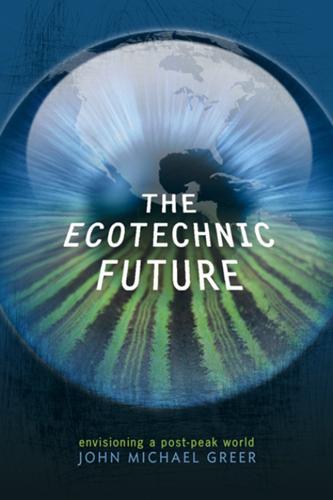
The Ecotechnic Future: Envisioning a Post-Peak World
by
John Michael Greer
Published 30 Sep 2009
Though no one was rude enough to mention this in public, that plan was a response to the imminence of peak oil, and found an audience once it became clear that the free market was not going to find a replacement for America’s dwindling oil reserves. The plan, outlined by the neoconservative Project for a New American Century, centered on American military occupation of the oil-rich nations of the Middle East, beginning with Iraq, under the threadbare rhetoric of “spreading democracy.”12 65 66 T he E cotechnic F u t u re History will not be kind to the neoconservatives. Their plan was poorly conceived and ineptly carried out, its goals are now utterly out of reach and its unintended results may yet include the implosion of American economic and military hegemony.
…
Wright, 16 mimesis, 195–197 Mollison, Bill, 103 Morgan, Alfred P., 156 N Naess, Arne, 221 nation-state(s), 46–47 Native American(s), 23 Nazi Germany, 161–162 neoconservative(s), 65–66, 226 New Alchemy Institute, 124 nomadic herding ecologies, 7, 61 nonrenewable resources, 7 NPK fertilizer, 110 nuclear energy, 12–13, 163–164 O organic agriculture, 24, 28, 103 Orwell, George, 58 overshoot, 5, 19, 22 ozone layer, 15 P paradox of production, 165–169 peak oil, 9–10, 159, 181 permaculture, 103–104 Polybius, 231 Popper, Karl, 227 production costs, 169–171 267 268 T he E cotechnic F u t u re Project for a New American Century, 65 projecting the shadow, 83 R R-selected species, 22–25, 30, 102, 110 Ray, Paul H., 200 reenactment societies, 158 Reich, Charles, 201 relocalization, 178 renewable energy, 12 resource nationalism, 64 retrofitting, 126–127, 150 revitalization movements, 62–63 Reynolds, Mike, 124 S Sagan, Carl, 207 salvage societies, 34–35, 70–74, 145 salvage trades, 148 Santayana, George, 194 scarcity industrialism, 34–35, 66–70, 106, 141, 145, 243 scientific method, 213–214 scientism, 207–8, 214, 217, 220–222 seral stage, 21, 70 sere, 21–22 Seymour, John, 103 socialism, 80 solar energy, 124, 127, 173 solvitur ambulando, 94 Spencer, Herbert, 58 Spengler, Oswald, 232–235, 238–240 Star Trek, 31 steel as salvage resource, 72–73 Steiner, Rudolf, 103 straw bale building, 123–124 succession, 20–36, 75–76, 241–242 survivalism, 80 Sutton Hoo, 135–136 system costs, 169–171 Index T Tainter, Joseph, 233 Taleb, Nassim Nicholas, 37 technic society, 30–32, 76, 243–244 Texas Railway Commission, xii Thomas Edison Technical School, 146 Thornburg, Newton, 177 Tikal, 71 Tolkien, J.
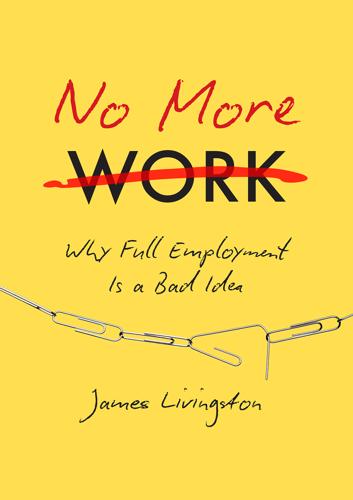
No More Work: Why Full Employment Is a Bad Idea
by
James Livingston
Published 15 Feb 2016
—it “profoundly influenced” the vote in the House on April 17.4 III You have to sympathize with Cook’s incredulity. What were these people thinking? These were the men who would soon become the archetypes of neoconservatism—or neoliberalism. Out of office, they would design what they called the Project for a New American Century. Back in power under George W. Bush, they would destroy every valuable remnant of that century by acting as if military power is the only measurable kind. What made their radical experiments and remarkable legislation seem justifiable in 1970? It’s not as weird as it looks in retrospect.
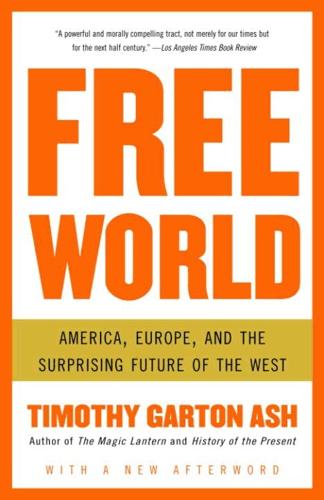
Free World: America, Europe, and the Surprising Future of the West
by
Timothy Garton Ash
Published 30 Jun 2004
Other, technologically smart ways should be found to conserve energy and save the environment—and he had some people looking into them.47 The environment was one of two foreign policy areas on which the new president had firm, well-developed views. The other was defense. He made a sharp and passionate case for a space-based national missile defense. In his inaugural address, he had said plainly: “we will build our defenses beyond challenge.”48 A detailed report from an important conservative pressure group, the Project for a New American Century, had already spelled out in September 2000 how this should be done and what extra defense spending would be needed. Several of its signatories—including Paul Wolfowitz, I. Lewis (“Scooter”) Libby, and Dov Zakheim—were now on the job, in the Pentagon and the vice president’s office. In the summer of 2001, they had already requested a $32 billion increase in defense spending.49 This administration’s neo-Reaganite determination to seize a historic opportunity to make the United States militarily invincible predated the 9/11 attacks.
…
Tony Blair convinced himself of that, but did George W. Bush? Iraq had been unfinished business for some Republicans ever since President George H. W. Bush had refrained from going all the way to Baghdad at the end of the first Gulf War. When Saddam Hussein expelled U.N. weapons inspectors in 1998, the Project for a New American Century had written to President Clinton urging that American policy should now aim “at the removal of Saddam Hussein’s regime from power.”61 An impressive number of signatories to that letter were now in key positions in the second Bush administration. They included Donald Rumsfeld, Paul Wolfowitz, and Richard Perle, all now at the Pentagon; John Bolton and Richard Armitage, both now at the State Department; and Robert F.
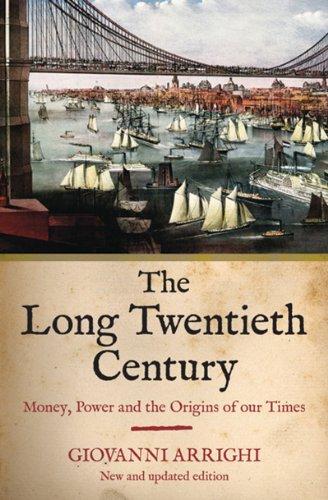
The Long Twentieth Century: Money, Power, and the Origins of Our Times
by
Giovanni Arrighi
Published 15 Mar 2010
Finally, and most important, the new regime would internalize the costs of reproducing both human life and nature, which the US regime has tended to externalize. We cannot rule out that some of these expectations will actually be fulfilled. Indeed, in Adam Smith in Beijing, I have argued that the first has already materialized and the second may be in the process of doing so. The unraveling of the neoconservative Project for a New American Century has for all practical purposes resulted in the terminal crisis of US hegemony — that is, in its transformation into mere domination. At the same time, the most important unintended consequence of the Iraq adventure has been the consolidation of the tendency towards the recentering of the global economy on East Asia, and within East Asia, on China.
…
This difference imposes constraints on the capacity of the Obama administration to pursue Keynesian policies at home or hegemonic policies abroad that are far more stringent than anything experienced by the Roosevelt administration. Notwithstanding these developments, the three post-US hegemony scenarios sketched in the Epilogue of this book all remain historical possibilities. Although the Project for a New American Century adopted by the Bush administration has failed utterly, this is not the project of world empire envisioned in We Long Tu/entiet/7 Century. The world empire envisioned in We Long Twentieth Century as a possible post-US hegemony scenario was a collective Western project. The idea that the United States would embark on a project of world empire virtually alone was deemed too foolish to be worth considering.
…
H., 314 Philip 11 (king), 217 Phillips, Kevin, 325 INDEX 413 Piacenza fairs, 134, 173, 187, 217, 244 Pirenne, Henri, 87, 122, 137, 251-52, 258-59, 340-41, 343 Plassey (1757), 213, 215 Polanyi, Karl: on British rule over world’s money, 179; on capitalism, 338; on exploitation, 270-71; /mute finance and, 171, 283; industrial production and, 263-64; on rate of exchange, 199; selfregulating market and, 72, 263—G6; on world markets, 339 Poor Law Amendment Act (1834), 265 Portugal, 41, 156, 157-58, 203 postmodern hyperspace, 81, 82 pound sterling, 192, 195, 197, 266 price logistics, 7, 8, 174 primitive accumulation, 373 production: Amsterdam and, 183; Braudel on, 183; in Britain, 168; capital accumulation and, 228; capitalist, 226, 236-37, 377; costs, 376, 377; distinction between trade and, 182; employment in, 238; employment of capital in, 228; expansions, 227-29, 339; Florence and, 185-86; Genoa and, 183, 185; Holland and, 183; industrial production, 263; internalized costs, 224, 226, 377; Italy and, 183; Marx and, 26, 227-28, 25859; in Milan, 185-86; state-making and, 185; systemic cycles of accumulation and, 8; in US, 300-302, 376; Venice and, 183, 185-86 profits, 227-28, 230, 365-66 Project for a New American Century, 379, 385 protection costs: Dutch, 149, 156, 376, 377; externalized, 154, 156, 363; France and, 51; Genoa and, 148-49, 154, 155, 156; internalized, 148-49, 155, 156, 181-82, 224, 376, 377; interstate power struggles and, 277; Portugal and, 157; reproduction costs and, 363; United Kingdom and, 51; US and, 376; VOC and, 159 pure dollar standard, 318, 323 Puritan Revolution, 42 quasi-states, 77-78 railways, 164-65 rates of exchange, 196-97, 199 Reagan administration, 72, 324-25, 326, 327, 342, 364-65 real estate investments, 183 Red Sea, 157 regimes of accumulation: British, 179-82, 223-24, 252, 277-78, 290-92, 300, 366, 376, 377; Dutch, 154-55, 160, 161-62, 179, 181-82, 183, 194, 223, 224, 252; East Asian, 363, 365; emergent, 360; Genoese, 149, 151, 153, 154-55, 160, 182, 183, 194, 222, 223-25; internalization of protections costs by, 377; lifecycles of, 222-23, 225; successive, 376-77; US, 221, 224, 290-91, 309-10, 315,316,363,366,367,381;\@neüan, 149, 151, 153 Reich, 273-74, 276 Reich, Robert, 73, 75 reproduction costs, 363 Ricardo, David, 264-65 Robinson, Ronald, 53-54 Rockefeller Center (New York), 18 Roosevelt, Franklin, 68-69, 283, 285-86, 287-88, 318, 338-39, 342 Roover, Raymond de, 107 Rosenau, James, 80 Rostow, Walt W, 352-53 Rothschild family, 171-73, 176, 218 Rowthorn, Robert, 314, 329 Royal African Company, 252-53, 254, 257 Royal Exchange, 195, 197 Rozenraad, C., 173 Rueff, Jacques, 281 Ruggie, John, 32, 38, 78, 81, 82, 83 rural revolts, 42-43 Russian Revolution (1917), 22, 65-66 Said, Edward, 54 Schevill, Ferdinand, 103 Schism (1378-1417), 99, 108 Schor, Juliet, 306-7 Schumpeter, Joseph, 30, 36-37, 122-23, 219, 336-38, 370 Schurmann, Franz, 66, 350-51 Scotland, 189, 202 SDI (Strategic Defense Initiative), 327 Second Cold War, 17 Second World, 22, 333, 334 secular cycles, 7, 8, 174 self-regulation markets, 72, 263-66 September 1 1, 2001 terrorist attacks, 384 Settlement of Vienna (1815), 53 settler colonialism, 50-51 Seven Years War (1756-63), 146, 21 1 Seville, 83, 131, 152 Sherman Antitrust Act (1890), 295 shipbuilding, 178, 182 signal crises, 220-21, 222, 243, 315, 323-24 silver, American, 134, 187, 256 Silver, Beverly, 381, 383 silver, Spanish, 156 Singapore, 23, 79, 344, 348, 349, 380 slaves and slavery, 50-51, 206, 252-53, 257 414 THE LONG TWENTIETH CENTURY Smith, Adam, 19-21, 227-29, 252, 295 Smoot-Hawley tariff (1930), 302 social conflicts, 42-43 saga 5/.705/Id, 356, 358 sound money, 115, 211, 215, 288 South, 334 South Africa Company, 258 South Asia, 162, 256, 317; See also East Asia; Eurasia; Southeast Asia South Korea: economics of, 344, 345, 348, 349; financial power in, 380; US and, 23, 70, 71, 79, 352, 353, 380; See aim Korea Southeast Asia, 23, 79, 348-49, 357, 360; See also East Asia; Eurasia; South Asia sovereignty, 76, 78, 342 Soviet Five Year Plan, 283 space-of-flows, 82, 85, 136f, 217-18, 360, 361f space-of-places, 81-83, 85 Spain: European power struggles and, 42; funds transport, 156; geographical expansions, 41; Imperial Spain, 58-59; trade in, 175f; trajectory of, 348; VOC and, 156; war-making techniques in, 41; wars fought by, 174; weakening of, 135 spices, 158-59, 206 Spruyt, Hendrik, 78 Stallings, B., 363 state monopoly capitalism, 153-54, 159-60, 166-67 state-making: early modern patterns of, 80; Europe and, 78; France and, 51, 78-79; Genoa and, 149-50, 152, 153-54; process of, 35; production and, 185; United Kingdom and, 51; Venice and, 149-50 Statute ofArtificiers (1563), 199 Steensgaard, Niels, 148, 149 stock markets, 142 Strange, Susan, 321 Strategic Defense Initiative (SDI), 327 subcontracting systems, 355-58 substitution, principle of, 260, 261 Supple, Barry, 201 surplus capital: in Britain, 266; conversion to commodities, 307; described, 167; Dutch, 138-39, 162, 163, 211-12; in East Asia, 368, 381; in Florence, 113; in Genoa, 1 13; interstate competition and, 177; in Japan, 368, 381; Marx on, 373; oil and, 321-22; profits and, 232-33; in Venice, 110-11, 113, 139-40; world surplus, 368 Sylos-Labini, Paolo, 22, 228 systemic chaos, 31, 45, 52, 64, 80, 285, 342, 368 systemic cycles of accumulation: Braudel’s notion of capitalism and, 8; British cycle, 6-7, 163-79; as capitalist phenomena, 9; concept of, 10; corporative comparison and, 24; description, 6, 89; development, 224; Dutch cycle, 6-7, 130-48, 156, 178; emergence, 374; financial expansions and, 129, 178; Genoese cycle, 6-7, 111-29, 148, 153, 175-76; life-cycles, 377; long centuries and, 220f; material expansion and, 231-32; metamorphosis model of, 242f; phases, 87, 96, 164, 177, 178; recurrence of, 242; secular cycles and, 7; sequence of, 88; signal crises of, 323-24; successive, 375, 380; territorialist-capitalist blocs and, 368; transitions, 350; US cycle, 7, 219, 247-48, 277-308 Taiwan: capitalism in, 23; economy of, 345, 348; foreign cash reserves and, 349; per capita GNP, 344, 346; US and, 79, 352, 353 Takeuchi, Hiroshi, 16, 17 tax revenues, 51 Temperley, H.
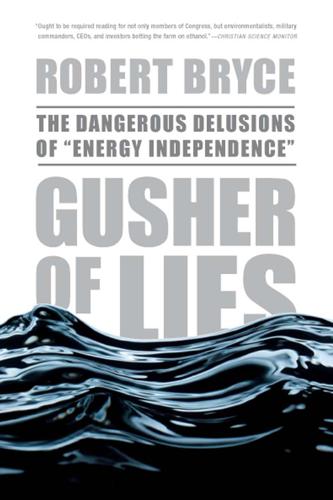
Gusher of Lies: The Dangerous Delusions of Energy Independence
by
Robert Bryce
Published 16 Mar 2011
The Nitze School has long been a hotbed of neoconservatism. Its roster of academics includes Eliot Cohen and Francis Fukuyama, who, like Cohen, was an early member of the Project for a New American Century.17 (Fukuyama has since left the fold. In 2006, he wrote a book in which he declared that neoconservatism “as both a political symbol and a body of thought, has evolved into something that I can no longer support.”18) The former dean of the Nitze School is Paul Wolfowitz, another founding member of the Project for a New American Century. He went on to become Deputy Defense Secretary from 2001 to 2005.19 At the time of the meeting, Luft’s new think tank was getting positive publicity thanks to its efforts to track pipeline attacks in Iraq.
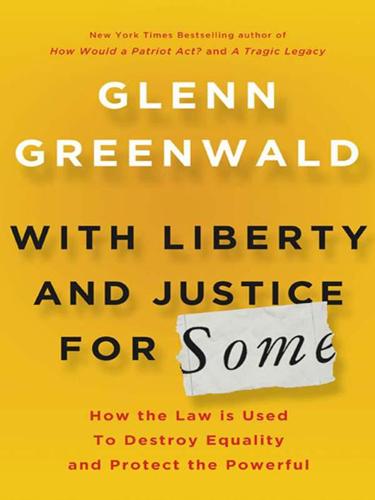
With Liberty and Justice for Some: How the Law Is Used to Destroy Equality and Protect the Powerful
by
Glenn Greenwald
Published 11 Nov 2011
Libby’s importance in the Bush administration went far beyond his title. He had long been one of the most well-connected politicians in the country. Along with Cheney, Donald Rumsfeld, Paul Wolfowitz, Jeb Bush, and Norman Podhoretz, he was one of the twenty-five signatories to the 1997 founding statement of Bill Kristol’s pro-imperial Project for a New American Century, which had called for an invasion of Iraq more than four years before the 9/11 attacks. Scooter Libby was at the very apex of the neoconservative movement that dominated Washington during the Bush 43 years, a top Bush aide and close intimate of America’s most powerful political and media figures.
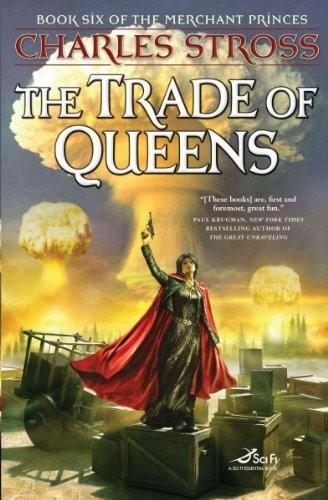
The Trade of Queens
by
Charles Stross
Published 16 Mar 2010
It was Sir Ulrich, one of the progressive faction's stalwarts, a medic by training. "Can they do it?" he asked. "You heard him." Olga's cheek twitched. Dread was a sick sensation in the pit of her stomach. "Let me remind you of WARBUCKS's history; he's a hawk. He was one of the main sponsors of the Project for a New American Century, he's the planner behind the Iraq invasion, and he's an imperialist in the old model. What most of you don't know is that back in the 1980s he was one of our main commercial enabling partners in the Western operation. And he's gone public about our existence. Getting back to your question: He's defined the success of his presidency in terms of his ability to take us down.
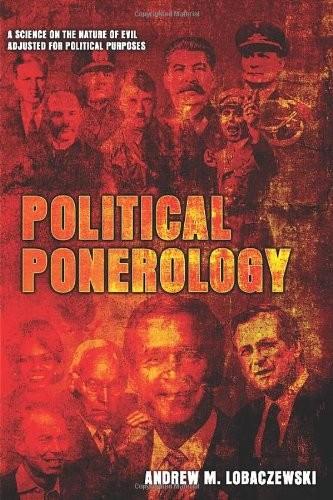
Political Ponerology (A Science on the Nature of Evil Adjusted for Political Purposes)
by
Andrew M. Lobaczewski
Published 1 Jan 2006
However, the contents of the Protocols are clearly not “hoaxed ideas” since a reasonable assessment of the events in the United States over the past 50 years or so gives ample evidence of thir application in order to bring about the current Neoconservative administration. Anyone who wishes to understand what has happened in the U.S. only needs to read the Protocols to understand that some group of deviant individuals took them to heart. The document, “Project For A New American Century”, produced by the Neoconservatives reads as if it had been inspired by the same schizoidal worldview. [Editor’s note.] * * * [5]: It is important to note here that it is not meant that the psychopath has been “emotionally” hurt, or that such “hurt” has contributed to their state of being.
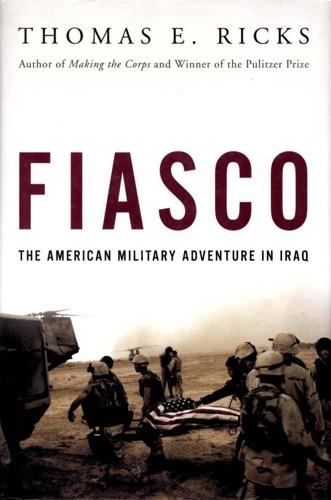
Fiasco: The American Military Adventure in Iraq
by
Thomas E. Ricks
Published 30 Jul 2007
While Franks was at least effective in getting what he wanted from underlings, the owlish Feith was a management disaster who served as a bottleneck on decision making. "He basically was a glorified gofer for Rumsfeld," said Gary Schmitt, who was hardly an ideological foe—he was the executive director of the Project for a New American Century, a small neoconservative advocacy group that pushed hard for the invasion of Iraq. "He can't manage anything, and he doesn't trust anyone else's judgment." People working for Feith complained that he would spend hours tweaking their memos, carefully mulling minor points of grammar. A Joint Staff officer recalled angrily that at one point troops sat on a runway for hours, waiting to leave the United States on a mission, while he quibbled about commas in the deployment order.
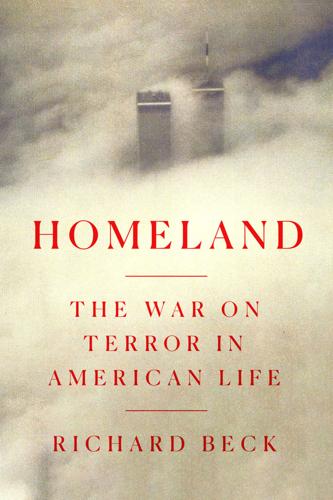
Homeland: The War on Terror in American Life
by
Richard Beck
Published 2 Sep 2024
Something about America’s superpower status had changed by the beginning of the twenty-first century, something momentous enough that the United States took a chance on militarizing its relationship to much of the rest of the world. In order to see what that something was, the next chapter will take a brief trip back through five hundred years of economic history. Chapter 8 The Sign of Autumn The unraveling of the neoconservative Project for a New American Century has for all practical purposes resulted in the terminal crisis of US hegemony—that is, in its transformation into mere domination. —Giovanni Arrighi, The Long Twentieth Century[1] In the modern global economy, there is one statistic that stands above all others as a measure of how things are going.
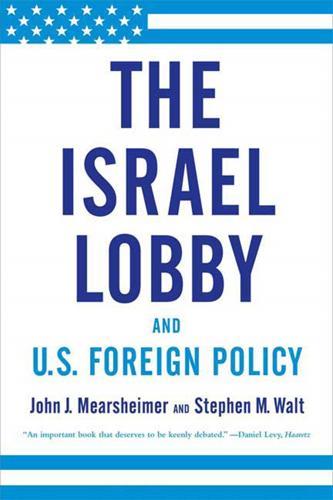
The Israel Lobby and U.S. Foreign Policy
by
John J. Mearsheimer
and
Stephen M. Walt
Published 3 Sep 2007
The think tanks and advocacy groups most closely associated with these neoconservatives are the American Enterprise Institute (AEI), the Center for Security Policy (CSP), the Hudson Institute, the Foundation for Defense of Democracies (FDD), the Jewish Institute for National Security Affairs (JINSA), the Middle East Forum (MEF), the Project for a New American Century (PNAC), and the Washington Institute for Near East Policy (WINEP). Virtually all neoconservatives are strongly committed to Israel, a point they emphasize openly and unapologetically. According to Max Boot, a leading neoconservative pundit, supporting Israel is “a key tenet of neoconservatism,” a position he attributes to “shared liberal democratic values.”71 Benjamin Ginsberg, a political scientist who has written extensively about American politics as well as anti-Semitism, convincingly argues that one of the main reasons that the neoconservatives moved to the right was “their attachment to Israel and their growing frustration during the 1960s with a Democratic party that was becoming increasingly opposed to American military preparedness and increasingly enamored of Third World causes.”
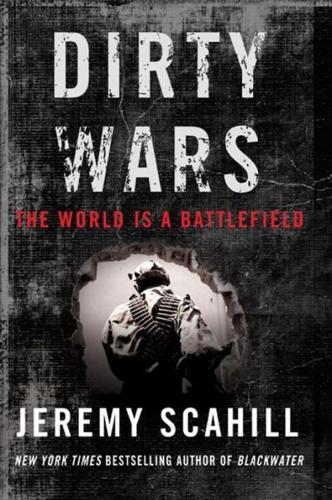
Dirty Wars: The World Is a Battlefield
by
Jeremy Scahill
Published 22 Apr 2013
For the senior officials in Bush’s national security and defense teams who spent the eight Clinton years—and more—developing those alternatives, the 9/11 attacks, and almost unanimous support from the Democratic-controlled Congress, provided a tremendous opportunity to make their ideas inevitable. In an eerie prediction of things to come, the neocons of the Project for a New American Century had asserted a year to the month before 9/11 in their report, “Rebuilding America’s Defenses,” that “the process of transformation, even if it brings revolutionary change, is likely to be a long one, absent some catastrophic and catalyzing event—like a new Pearl Harbor.” Cheney and Rumsfeld may not have been able to see 9/11 coming, but they proved masters at exploiting the attacks.